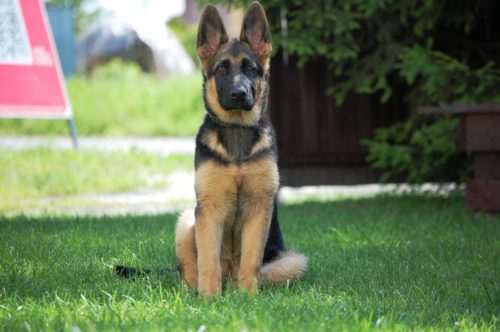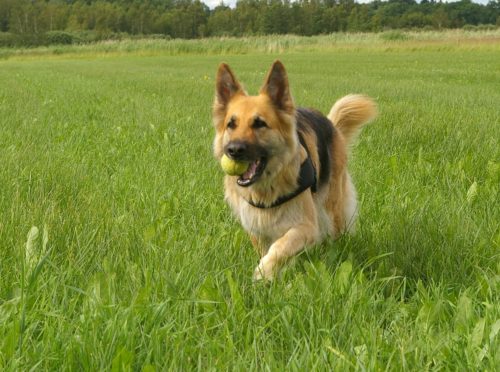The German Shepherd is a King’s companion. Regal beyond measure, intelligent, and unfalteringly loyal, these canines are master class. They’ve been in the top five most popular dog breeds since their emergence in the late 19th century and have held that spot sternly. In fact, the German Shepherd has not yet seen a decline in popularity.
If you’ve landed on this page it might be that you’re interested in buying a German Shepherd dog. Or perhaps you’re curious as to the innate and natural personality of the dog breed. Before we continue and address your curiosity, know this: the German Shepherd’s popularity spawns from their unrivaled excellence.
These are brilliant canines with an aptitude for mental stimulation, love, and knowledge. They’re the dog with the resilience and physicality to be a grand adventurer, then the soft interior that’ll have them cuddling up next to you in bed once the night settles in.
A Brief History of German Shepherds
Despite their great popularity, the German Shepherd’s lineage is rather short. This breed originated in Germany during the late 19th century, when a German cavalry captain decided he was going to be ‘breed the world’s most dexterous herding dog.’ While not everyone will agree that the German Shepherd fits that description, he certainly succeeded in creating one of the most well-rounded dogs to date.

The affluent captain, Von Stephanitz, had the resources to round up the most prized German herding dog breeds. Traveling throughout various regions, he eventually began to crossbreed certain canines he found to be ‘alphas’ among others.
After various renditions, he eventually bred the German Shepherd we know today (the dog breed hasn’t changed much over the years, being that it’s still relatively new).
These dogs were immediately prized for their astounding intelligence, keenness, and athleticism.
Although Captain Max Von Stephanitz wanted a herding dog, what came about was a working-class companion that was immediately integrated into the German Military pre-WWI.
If trained well they were strong enough to be pack dogs, understand a slew of commands, and serve as an aid to soldiers.
Eventually, this breed migrated to the US. This breed serves as a guard dog, police dog, therapy dog, guide dog, military dog, drug dog, rescue dog, service dog, and more. The German Shepherd has single-handedly created a working-class exclusive to no other breed. Simply put: when it comes to trainability, they’re in a league of their own.
The reason this is important is it paints the picture you need to know about the German Shepherd; they’re a dog that thrives from having a job to do and they require excessive stimulation to satisfy their inherent desire to be challenged.
They’re a working dog breed sharp enough to learn various jobs and strong enough to execute them skillfully. Once they came to existence, they were immediately integrated into the workforce. This natural workmanship is the very root of their confident and aloof personalities.
German Shepherd Personality
Due to the demand and popularity of this breed, puppy mills have produced variations of the German Shepherd breed that pay little similarities to the dog’s natural archetype.
Von Stephanitz said ‘the most striking features of the correctly bred German Shepherds are firmness of nerves, attentiveness, tractability, watchfulness, reliability, and incorruptibility together with courage, fighting tenacity and harness.’ The ‘alpha-like’ personality of a German Shepherd, as it should be, is confident yet not self-indulgent.
Confident and aloof
The German Shepherd is a dignified dog that is loyal, aloof, and somewhat antisocial. From the moment they begin development they’re craving stimulation. This lust for knowledge and challenge is often the vehicle behind this breed’s booming curiosity, which wanes as they emerge from their puppy years.
Often times a canine that is aloof or cautious towards strangers is a product of a poor upbringing. Early socialization and training paired with tasty treats like CBD for pets are an imperative when it comes to cultivating the best personality and temperament from a dog, so when they’re not handled appropriately the effects manifest in adulthood.
Cautious
The German Shepherd breed, despite early canine socialization or training, is naturally aloof. Generation upon generation of training and breeding has created a natural guard dog out of the breed and this archetype comes with an attentiveness absent in most dogs. It’s not that the German Shepherd is aggressive or unwelcoming towards strangers, but simply that they’re keen on them, cautious, and hold an air of reservation before deciding to trust.
Loyal
Another huge aspect of the German Shepherd personality is their steadfast love and loyalty. Some owners say there is no bond like that of a German Shepherd shares with their family. The hard and stoic exterior is replaced with a cuddly, downright loving fluff ball within the home. They’ll treat the children as their own and willingly participate as the protector of the home.
Playful

Setting aside their superior bravado, these dogs also love to play and they’re intelligent enough to interact in a wide array of games.
Their affection is much like a reward, as it’s a secret pact formed between the German Shepherd and their family that they allow no one else to touch.
Due to this, if a German Shepherd feels they are being neglected they’re prone to develop extreme separation anxiety and become destructive within the home. Regardless of their independent nature, German Shepherds are extremely dependent upon the person(s) they’re closest to.
Regardless of their independent nature, German Shepherds are extremely dependent upon the person(s) they’re closest to.
All in all German Shepherds have a golden personality. They’re lovely and charismatic within the home, aloof towards strangers, and confident to a point that they can often put their owners to shame. Great with children, avid learners, and incredible athletes, many would agree they’re the most versatile family dog in existence.
German Shepherd Temperaments
The purebred German Shepherd dog exhibits the temperament of a trained fighter. They’re calm, assertive, aware of their capabilities, and only excitable if the situation calls them to action. It’s important to revert back to their origin here, as due to their herding dog heritage, they do have quite a strong prey drive.
This is noticed particularly in their youth, as their lust for mental stimulation and game make them extremely active and energetic. Point being: German Shepherds require quite a bit of time in their youth and if the owner is absent, their well-rounded temperaments can go awry. But these are docile, obedient creatures and their willingness to learn often overpowers their early enthusiasm.
As puppies
When it comes to their puppy years, expect an active dog that’s always surging with energy, but one that will stop to listen to you too (and love doing so). They’re generally affable and their temperaments are even-keeled despite the situation they’re in.
As adults
German Shepherds aren’t the most pleasant to other canines, despite how they were raised. Naturally, the purebred German Shepherd doesn’t have a propensity to turn aggressive, but because they’re alert and fearless, if they misread a situation they can turn to aggressive behavior.
This is a characteristic that owners need to be aware of when deciding to own a German Shepherd, as it can become problematic in the future. But by in large German Shepherds have a stable temperament that leans more towards excitability in their youth, then wanes as they age. They’re calm, alert, and intensely watchful.
Ensuring Good Temperament & Personality In German Shepherds
Puppy Mills
Every popular dog across the world falls victim to the supply and demand phenomenon. Irresponsible breeders rush to mass-produce puppies to keep up with market demand. Unfortunately, this paves the way for poorly bred canines, which is something that occurs frequently with German Shepherds.

If you’re canine was bred improperly—no matter the strides you take in training and socializing him—he is going to have a propensity to demonstrate inauthentic personality traits and poor temperaments. They might even come with underlying health problems.
That’s why it’s incredibly important that a potential owner thoroughly researches their breeder. Be sure to not only validate their reputation but to obtain clearances for both the parents.
It’s also recommended that you meet the parents, as their personalities and temperaments are often indicative of how that little pup is going to be once he is an adult.
Socialization
A poorly socialized dog is often a poorly tempered one. It’s important that your German Shepherd receives early-socialization.
This means he needs to be acclimated with different environments, people, and canines early in his youth. Being that this breed has an aptitude to be aloof, if your pup isn’t properly socialized with pets and the world around him then he can turn inwards.
Remember that this breed’s intelligence is among the highest of dog breeds. Their ability to process information, register their sensory input, and remain alert in situations is nearly unparalleled. If they’re not comfortable in an environment then that very keenness can make them anxious, timid, destructive, and aggressive.
As mentioned before—while you shouldn’t expect a bumbling socialite out of your German Shepherd—your pup should be comfortable in his environment. It’s often recommended that as soon as you bring your German Shepherd puppy home, you should begin to socialize him and introduce him to different environments.
Training
In short: purebred or not, if you want to help ensure a good personality in your working dog, then he will need extensive canine training together with natural supplements like CBD for dogs that support his health. Fit with a mind that’s starving for simulation, training is this breed’s lifeblood. This is made quite obvious by how many industries now use German Shepherds as some sort of utility. Their training has no bounds, thus it’s completely up to the owner as to how trained they want their dog to be.
However, it’s recommended that this breed is trained professionally. Due to the nature of these animals, it’s greatly beneficial to take your German Shepherd to an experienced trainer. While German Shepherds are docile, their lust for a challenge can often make them mischievous, and if they please, they can become challenging.
More so, professional training will also help socialize German Shepherds with other canines—which is imperative to their development as they are not naturally inclined to be friendly towards other dogs.

At the very least, if you want that shining German Shepherd personality and temperament, give them a job to do.
Even if this simply means creating structure within the home and posing your pup as the ‘guard dog,’ a job instills purpose which also winds up stimulating him.
As long as they are given the proper supplements and the proper steps are taken to ensure the healthy development of your German Shepherd, there’s no reason he shouldn’t have a stellar personality and temperament.
Beyond that, this breed can be trained to serve any utility within their capabilities, and within the home, they’ll offer a part of them to the family they allow no one else to experience.
A German Shepherd is a true reward—and that’s widely apparent being that they’re the #2 dog in America.
Sources:
- “German Shepherd Temperament & Personality.” German Shepherd – Temperament & Personality, 6 Oct. 2017, Accessed 19 Oct. 2017. www.canna-pet.com/german-shepherd-temperament-personality/.
- “Dog Breeds: The German Shepherd Temperament and More.” Chewy, 21 Aug. 2018, Accessed 19 Oct. 2017. www.chewy.com/petcentral/dog-breeds-german-shepherd-temperament/.
- “German Shepherd Dog Breed Spotlight: 5 Essential Traits.” Rover, 31 May 2018, Accessed 19 Oct. 2017. www.rover.com/blog/german-shepherd-dog-breed-information-traits/.
- Shepards, Sam. “German Shepherd Breed Characteristics.” PetHelpful, 23 June 2018, Accessed 19 Oct. 2017. www.pethelpful.com/dogs/German-Shepherd-Breed-Characteristics.
- “Why Are German Shepherds Easy To Train – Wag!” WagWalking, 27 Mar. 2018, Accessed 19 Oct. 2017. www.wagwalking.com/behavior/why-are-german-shepherds-easy-to-train.




